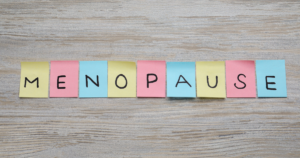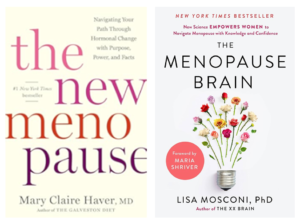Menopause
What is it?
 Menopause is a unique journey for each person with a uterus. It is a natural phase of life when ovaries stop producing eggs. This results in declining levels of the hormones estrogen and progesterone.
Menopause is a unique journey for each person with a uterus. It is a natural phase of life when ovaries stop producing eggs. This results in declining levels of the hormones estrogen and progesterone.
Menopause is not just a physical transition; it also can affect an individual’s mental and emotional health. As your hormone levels change, you may experience mood swings, anxiety, and even depression. It is important to recognize the symptoms of menopause and understand its potential impacts. It is also important to be aware of the options available to manage menopause in a way that is comfortable and meaningful for you.
Menopause happens in three phases. Click the headers below to learn more about each phase.
Perimenopause (click to expand) »There is a transitional phase called perimenopause before you reach menopause. Hormone levels fluctuate during perimenopause. This stage typically occurs between the ages 45 and 55 (though it can start earlier). It can last six to eight years. Symptoms of perimenopause vary for each person. Some people may have no discomfort. Other people may find it challenging to cope. These symptoms may include:
|
Menopause (click to expand) »A person reaches menopause when they have not had a period for 12 months in a row. This happens due to declining hormone levels. The ovaries no longer release an egg every month. Check out this handout from The Society of Obstetricians and Gynecologists of Canada: ‘What is Menopause?’ Early and Late Menopause
Surgical and Medical Menopause When both ovaries are surgically removed, menopause starts. If the uterus is removed, but the ovaries are not, menopause does not happen immediately. However, menstrual periods will stop. Surgical menopause happens suddenly. It can cause more severe symptoms than natural menopause. Chemotherapy, radiation, or ovarian suppression therapy can cause medical menopause. |
Post-menopause (click to expand) »The final stage is post-menopause. After reaching menopause, every day after is post-menopause. This lasts for the rest of your life. People may experience lingering symptoms caused by low levels of hormones, such as:
People in this stage are at an increased risk for health conditions, such as heart disease, osteoporosis, and genitourinary issues (issues related to genital and urinary organs). |
Management and Treatment
Menopause can be a challenging time in a person’s life. This is due to all the changes it brings.
There are options available to manage the symptoms associated with menopause. These include:
- hormone-based
- non-hormonal
- complementary therapies
Learn more about these options by visiting Menopause and U: Therapies and/or talking to your health-care provider.
Check out the ‘Staying Healthy During and After Menopause’ infographic from the National Institute on Aging.
Sexual Health and Menopause
Sexual activity can still be an important part of a relationship after menopause. There are many benefits to being sexually active in later years. It can help keep sexual organs healthy. For example, it increases blood flow to the genital area, keeping the vagina healthy.
There are some factors that may affect sexual health, including:
- Vaginal fluid changes (vaginal dryness, itching, burning)
- Pain during sexual intercourse
- Vaginal discharge
- Vaginal bleeding
- Recurrent urinary infections
- Loss of bladder control
- Decreased sexual desire
There are options available to help with the symptoms. Many individuals maintain good sexual relationships after menopause.
For more information, visit Sex & U and The North American Menopause Society- Sexual Health & Menopause Online or consult your health-care provider.
Podcasts
- Menopause with Dr. Shafeena Premji and Janet Ko – Canadian Women’s Foundation
Resources for Youth
It is important for young people with a uterus to understand the changes their bodies go through as they grow older. It is natural to be curious about these changes. It is a healthy part of the reproductive life cycle.
Check out the video below to help youth understand menopause.
- Menopause Explained, Amaze Org
Videos About Menopause
- What is Menopause?, National Institute on Aging
- What are the Signs and Symptoms of Menopause, National Institute on Aging
- Tips to help Manage Menopause Symptoms, National Institute on Aging
Books and Other Resources
 Check out these books at your local NL Public Libraries location!
Check out these books at your local NL Public Libraries location!
- The New Menopause, Mary Claire Haver
- The Menopause Brain, Lisa Mosconi
Services related to this information:
- Contact Planned Parenthood — NL Sexual Health Centre at 1-877 NO MYTHS (666-9847) or 709-579-1009
- Contact your Public Health Nurse:
- Newfoundland and Labrador Public Libraries
- Bridge the gapp
Newfoundland and Labrador’s ‘go-to’ website for mental health information. Bridge the gapp offers self-help resources, links to local services, and invites people to share their personal stories. Bridge the gapp is free of cost and available to every resident in the province. The site is divided into adult and youth sections, however many services are appropriate for both.- 811 HealthLine (Newfoundland & Labrador) – Call 811 or 1-888-709-2929 / TTY 1-888-709-3555
- 811 is free and confidential. 811 is available 24/7 and can provide support with mental health and addictions issues and more.
- Services formerly offered by the Provincial Mental Health Crisis Line are now offered by 811. Call 811 to speak with a registered nurse who is also a trained crisis intervener.
- Canadian Mental Health Association NL
Eastern-Urban:
- Contact the Sexual Health Clinic at sexualhealthclinic@easternhealth.ca.
- Contact the community walk-in clinic (Mundy Pond) at 709-777-1706.
